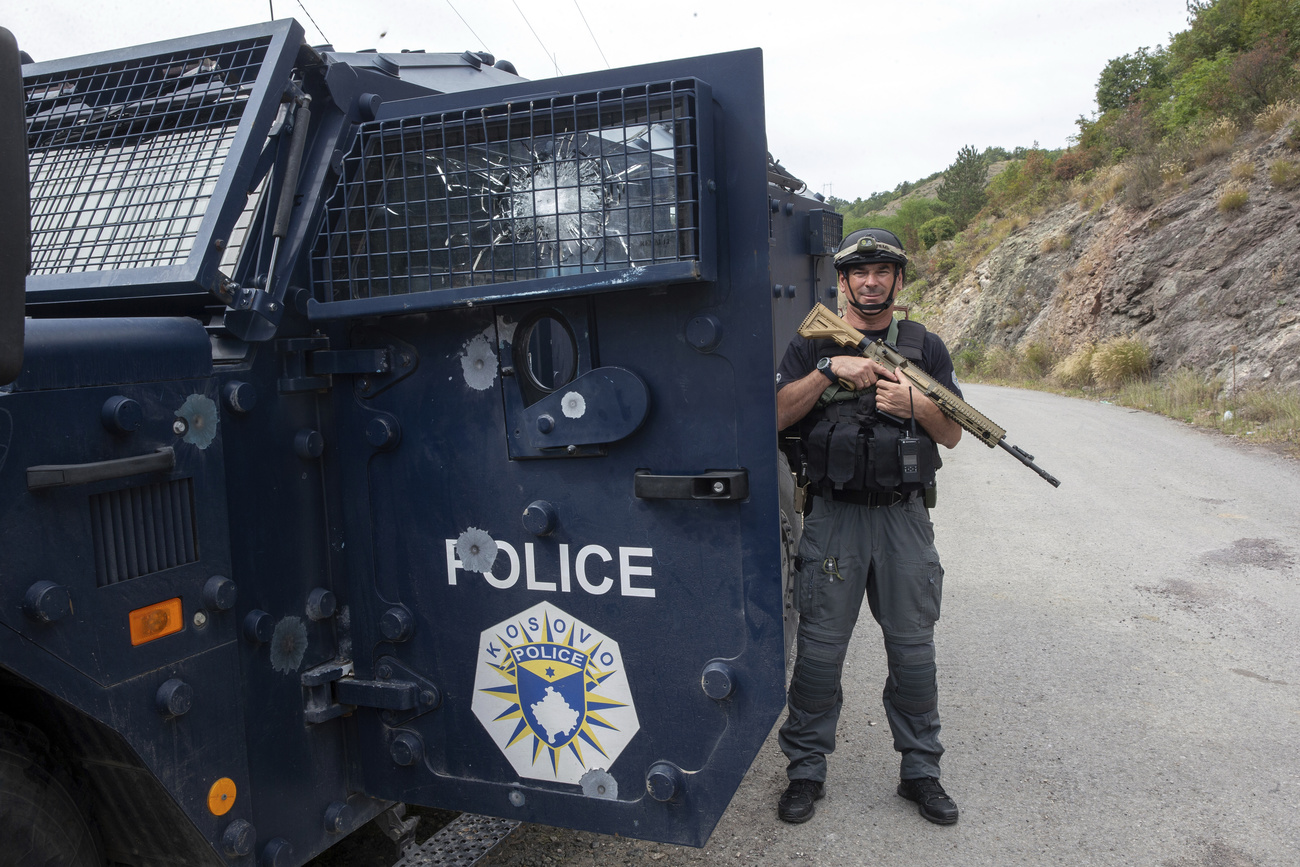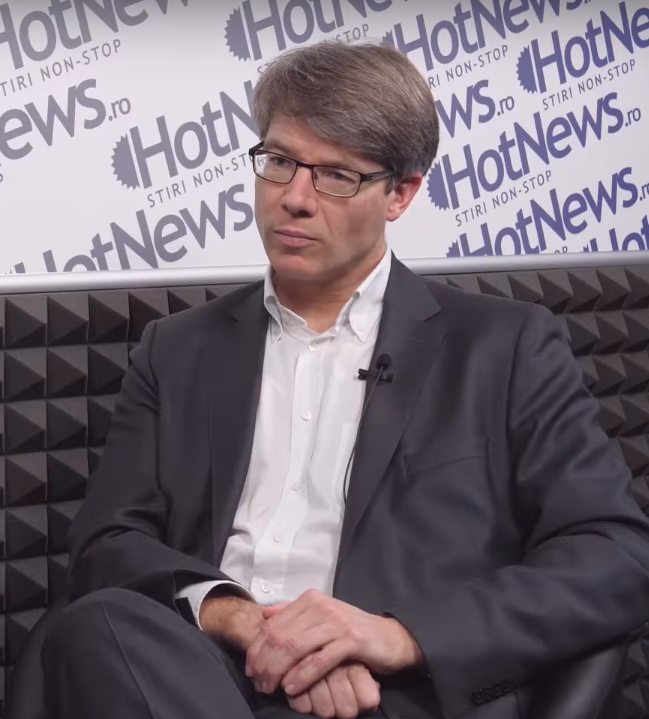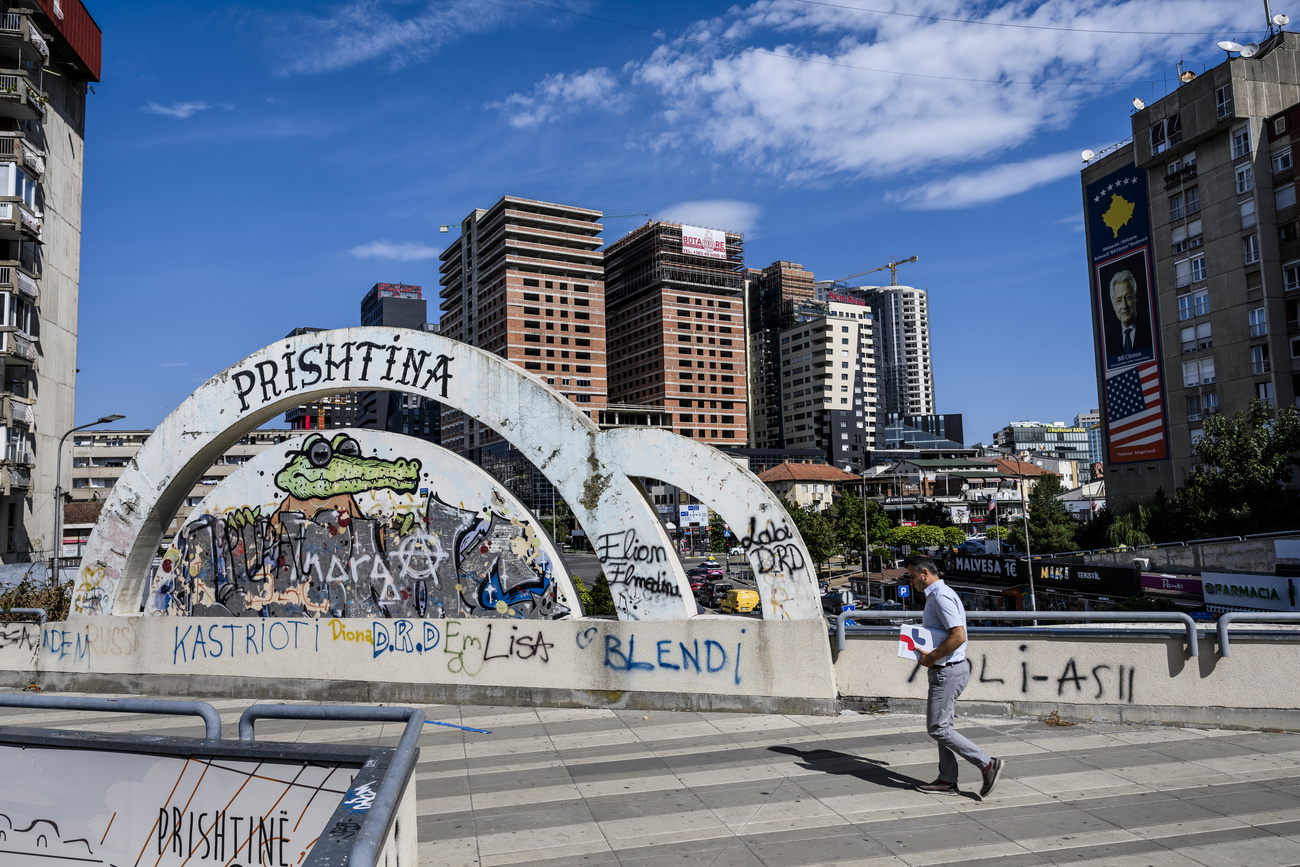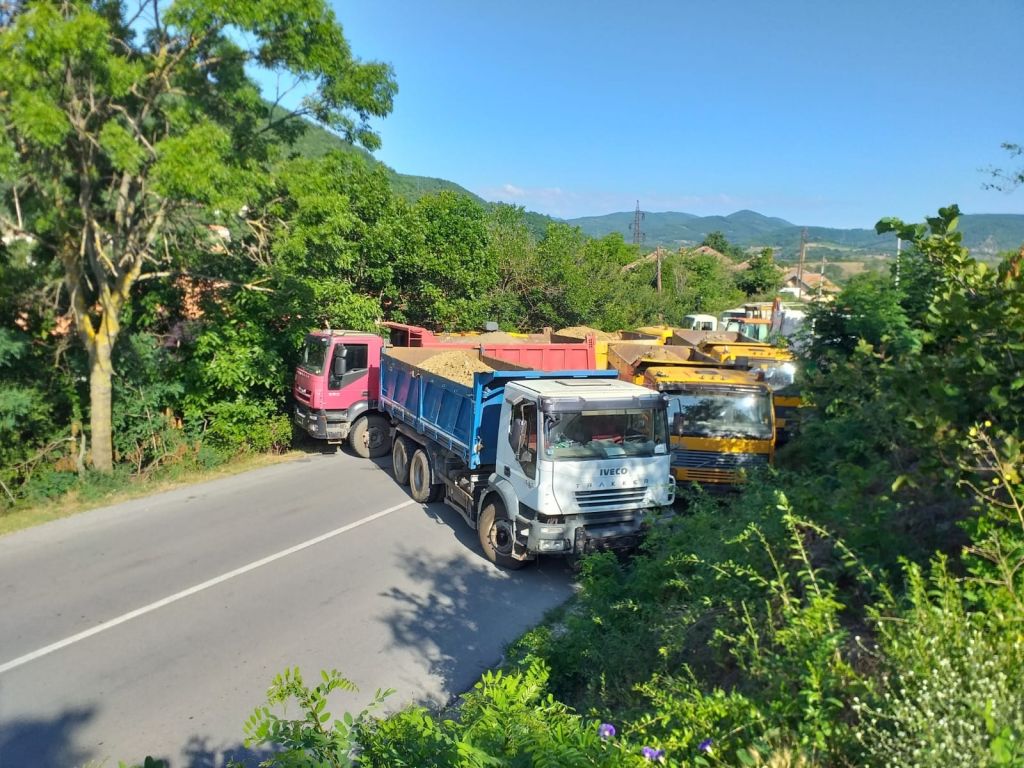
‘Swiss diplomacy in Kosovo is not very visible’

Swiss historian Oliver Jens Schmitt discusses the situation in Kosovo and the failures of Switzerland and other Western countries.
SWI swissinfo.ch: Often using military force, Russia has imposed pro-Russian separatist movements in Abkhazia, South Ossetia, Transnistria and, of course, in eastern Ukraine. But Putin has always batted away any criticism, saying that NATO intervened on the side of Kosovo in 1999. Is this a fair comparison?
Oliver Jens Schmitt: No, these are two completely different things. One was a humanitarian intervention to prevent one of the greatest crimes since 1945. The other is cynical power politics to weaken sovereign states.
Russia is trying to construct a theory of international law that deliberately ignores the context: from the late 1980s under Milošević, Serbia pursued the goal of discriminating against and ultimately expelling the Albanian majority in Kosovo. Serbia has committed the most serious human rights crimes with Serbian perpetrators systematically murdering and deploying sexual violence against the population, destroying 40,000 homes and much of the cultural heritage.
A government that acts against its own people like this forfeits the right to rule over them. The Albanians in Kosovo had already declared their independence in 1991. NATO’s international intervention in 1999 aimed to protect basic human rights and prevent mass expulsion.
The situation in the territories now effectively occupied by Russia is different. These are former Soviet republics whose borders were once drawn by Stalin with the intention of ensuring that republics such as Georgia and Moldova included areas with minorities that would destabilise the young states if they broke away from the Soviet Union. This is exactly what happened. Putin, unlike NATO, didn’t protect minority rights – instead, he deliberately created conflicts.

SWI: Kosovo as a region is charged with a great deal of conflicting significance. What does it signify in Serbian memory and what is its importance in Albanian memory?
O.J.S: Until independence in 2008, Kosovo was not a sovereign state, and before 1945, it was not even a territorial entity. So the term “Kosovo” stood for a landscape. A regional identity, on the other hand, didn’t exist for a long time, only the perception of a region whose borders were vague.
Serbians and Albanians tell stories about it that are similar, in that each excludes the other. In the West, only the Serbian version was known for a long time. It goes like this: the Slavs reached Kosovo in the early Middle Ages, and in 1389 the Serbians were defeated defending the Balkans against the Ottomans. This gave rise to the myth of the Battle of Kosovo, in which Serbia’s Prince Lazar was killed in the name of Christianity and the Serbian nation.
This myth was used by the Serbian state at the end of the 19th century to illustrate the Serbian claim to this region. According to the Serbian view, Kosovo’s catastrophe began with the immigration of Albanians. In this version, they arrived at the end of the 17th century, as beneficiaries of Ottoman rule. However, historical research shows that the Albanians are one of the oldest language groups in Europe and lived in Kosovo long before the immigration of the Slavs. The ahistorical Serbian version claims exactly the opposite. In the 1980s, the Serbian Academy of Sciences even suggested that the Albanians were committing “biological genocide” against the Serbs through high birth rates.
SWI: Serbian President Aleksandar Vučić recently complained to Vladimir Putin about alleged ethnic cleansing against Kosovo Serbs. Vučić said this after four died in violence between armed Serbians with criminal connections and the Kosovo police.
O.J.S.: Who are the Kosovo Serbs? The Kosovo Serbs essentially fall into two groups: first, those who live in scattered settlements in Kosovo. There are no major problems there. It is an aged population. Many young people leave Kosovo because of a lack of prospects, and Serbians are no different from young Albanians in this respect.
Second, a more numerous group lives compactly in the north of Kosovo, where it forms a state within a state, financed by Belgrade. This actually offers material advantages: pensioners receive two pensions, one from Kosovo, the other from Serbia. Northern Kosovo is also an important hub for organised crime. There is no police force in the region. Organised crime groups have an interest in preventing the Kosovo police from entering. When they do, every police action is labelled ethnic violence. The incident mentioned above made clear to the whole world how closely organised crime and political violence are linked. It also became clear how intertwined these groups of criminal political actors are with the government in Belgrade.
The issue is charged. This goes so far that the Serbian constitution attaches great importance to Kosovo – an independent state – and all Serbian institutions are committed to the goal of bringing Kosovo back under the country’s control. Serbian nationalism and myth are obstacles on Serbia’s path to the rule of law and democracy. Serbia is a long way from that right now.

SWI: Serbia is economically dependent on Russia. Has the external view of Kosovo changed since the Russian war of aggression in Ukraine?
O.J.S.: Initially, it was believed that Kosovo would benefit from the geopolitical shift, because Ukraine’s relationship with Russia has many similarities to Serbia’s relationship with Kosovo: Russia and Serbia dispute not only the statehood of the other country, but also its existence as a people. They want to dissolve the other people, integrate them into their own territory or drive them away. There are even Serbian theories according to which the Albanians are actually Serbians who converted to Islam.
But until the acts of violence by Serbian extremists in September 2023, it was the Kosovar government that was rather isolated, because the Serbian government has a good connection to the US thanks to war-related ammunition supplies to Ukraine. Vučić, who is also ideologically inclined towards Russia, is not a democrat but an authoritarian ruler who acts brutally domestically. The fact that the West is courting him is also dangerous for the reason that Kosovo is the only functioning democracy in the region. People in Ukraine rightly say that they are defending Western values such as democracy. By taking a position in favour of Vučić, the West, and above all the US, is damaging Kosovo, where these values – with the support of Western states – are more respected than in Serbia.
SWI: So you see the development of democratic institutions in Kosovo since independence in 2008 as positive?
O.J.S.: Kosovo has a vibrant party landscape nowadays. Meanwhile, countries like Serbia and Albania have fallen behind in democratic development. Either elections aren’t free, or the opposition doesn’t accept the results and blocks parliament, at least temporarily.
There is still definitely a lot that is in a sorry state in Kosovo, such as the widespread corruption of state agencies. But you have to remember where this state started out: a population traumatised by oppression, war and expulsion – a country that had suffered widespread devastation in every respect. The litmus test for any democracy is whether a government that has been voted out accepts its defeat. Even if Albin Kurti’s government is hotly debated, changes of government are possible through elections. The society isn’t trapped in an authoritarian mindset, as is still widely the case in Serbia or Albania.
SWI: Switzerland recognised Kosovo’s independence the month it was announced. It seems to be one of the few moments when Switzerland took a foreign policy stand. What remains of this?
O.J.S.: The recognition was clumsy because it was spontaneous and not embedded in any strategy. Today, Swiss diplomacy in Kosovo is not very visible, considering the importance of Switzerland in Kosovo and the Kosovar diaspora in Switzerland – it is less active than Austria. Swiss politicians, for example, hardly ever show up in Kosovo. Albin Kurti, on the other hand, interferes in the Swiss election campaign on behalf of his partner party, the Social Democratic Party. Yet Switzerland should have an interest in providing information to the public in Kosovo, especially about the Swiss political system.
SWI: Why?
O.J.S.: During my most recent visit to Kosovo, I noticed that Islamist ideas were spreading among parts of the younger generation. This development also worries the secular majority in Kosovo.

More
How Swiss parties court the Kosovar diaspora
The West also bears some responsibility for the rise of Islamist currents: Kosovo was the only country in the western Balkans where the people were not granted freedom of travel without a visa for a long time. Instead, Kosovars could travel mainly to Islamic countries, and these supported them very actively, for example through scholarships. So we in the West shouldn’t be surprised if young people come back from Turkey or the Gulf states with the mindset of the regimes there. The same states have also invested in schools, universities and hospitals in Kosovo.
Kosovo is small. With a manageable but concentrated use of funds, but also stronger political gestures, rich countries like Switzerland could achieve a lot. But I get the impression that Swiss politicians are averting their eyes – from the left wing to the right, there is still no coherent strategy on how to deal with the large Kosovar diaspora. While Kosovars know a lot about Switzerland, even representatives of the Swiss elite have no idea about Kosovo.
Edited by David Eugster. Translated from German by Catherine Hickley

More
Swiss keep an eye on tensions in Kosovo

In compliance with the JTI standards
More: SWI swissinfo.ch certified by the Journalism Trust Initiative






























You can find an overview of ongoing debates with our journalists here . Please join us!
If you want to start a conversation about a topic raised in this article or want to report factual errors, email us at english@swissinfo.ch.